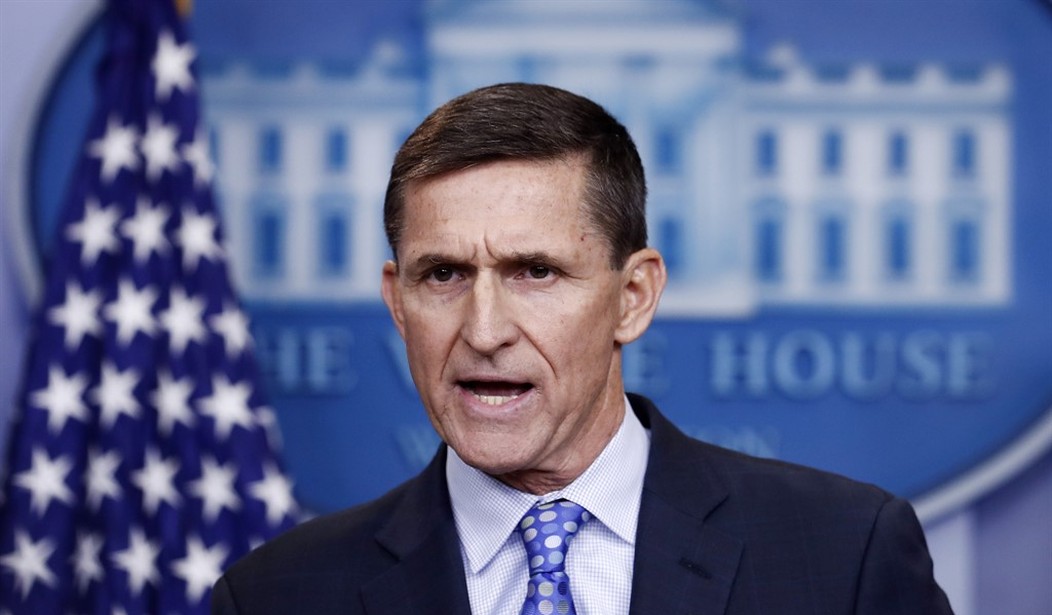Flynn’s lawyer claimed a few days ago that he notified DIA, his former agency, before he went to Moscow in 2015 and received nearly $35,000 for an appearance from RT. That’s not what the Pentagon’s records say, though, per House Oversight Committee member Elijah Cummings. They have no record of Flynn informing them of the RT payment. And Flynn can’t plead ignorance of the law: The Committee has another document, this one from 2014, in which DIA warned Flynn explicitly that he’d need permission in order to accept payments from a foreign government. That’s due to our old friend the Emoluments Clause, which, under the DIA’s interpretation, bars receipt of “consulting fees, gifts, travel expenses, honoraria, or salary” by a retired military officer without approval. (The Emoluments Clause specifies congressional approval but Congress has ceded its authority to approve payments received by military members to the secretaries of Defense and State.)
So why didn’t Flynn seek approval before the RT event? Did he maybe suspect that banking a few rubles to sit next to Vladimir Putin at the RT dinner might not have gone over well at DIA?
“These documents raise grave questions about why General Flynn concealed the payments he received from foreign sources after he was warned explicitly by the Pentagon,” said Rep. Elijah Cummings, the top Democrat on the House oversight committee, in a statement. “Our next step is to get the documents we are seeking from the White House so we can complete our investigation. I thank the Department of Defense for providing us with unclassified versions of these documents.”…
“I honestly don’t understand why the White House is covering up for Michael Flynn,” Cummings said. “I don’t get it, after the President fired him for lying — they should be bending over backwards to help us. It does not make any sense and it makes the American people think they have something to hide. There is a paper trail that the White House does not want our committee to follow it.”
The oddest thing about this is that it’s not news that Flynn received money for the RT appearance. He admitted to it in an interview last August, although he didn’t disclose the amount. Why would he try to conceal it from DIA only to chatter about it on the record a year later to the Washington Post?
Because Flynn publicly acknowledged the payment long before election day, the Trump transition team and later the Trump White House had plenty of notice that there might be an issue here. Presumably that’s why Cummings is so eager to see the White House’s records on Flynn and possibly why the White House is reluctant to share them. Ed speculated on Tuesday, when Cummings and Jason Chaffetz revealed that they’d similarly seen no disclosures by Flynn of the foreign lobbying money he got from Turkey, that Trump might be withholding documents as a matter of executive privilege. It’s not that he’s trying to suppress something embarrassing about Flynn (e.g., that he also neglected to inform the White House of his lobbying work), in other words, but that he’s trying to set a precedent early in his term that Congress shouldn’t expect to get executive-branch records on demand in its investigations. Maybe, though, the reason they’re sitting on the records is less principled and more political — namely, the records might show that the transition team did have an inkling that Flynn hadn’t properly disclosed his payments and they … went ahead and made him national security advisor anyway.
That would help explain the lingering mystery of why so many top people in the Trump White House, from Priebus to Kushner to Bannon to Trump himself, seemed to be looking for a pretext to push Flynn out as soon as possible. The stated reason for his resignation, that he misled Mike Pence about his phone call with the Russian ambassador, was a flimsy excuse. It could be that the White House found out about the concealed payments but maybe too late in the transition process to drop Flynn as NSA without causing huge embarrassment to the incoming administration and angering Trump’s populist base. They may have realized that the dirt would come out eventually, though, and that it would cause them a major headache when it did — why was the national security advisor hiding foreign money from the Pentagon? — so they started looking around immediately for other reasons to force his resignation. When the Kislyak matter arose, they seized the opportunity. In fact, I’ll repeat a pet theory I floated once before: Maybe the source for WaPo’s famous expose of Flynn’s call with Kislyak weren’t just treacherous members of the “deep state” but people in the Trump White House too. Remember, the White House knew about Flynn’s phone call with Kislyak courtesy of Sally Yates weeks before it was revealed publicly in the Post. If they wanted Flynn out early because they saw this non-disclosure scandal cloud on the horizon, they might have dropped a dime on him themselves.
If so, it would answer Cummings’s question in the second clip as to why the White House would be covering for Flynn when they’ve already fired him for lying. Answer: Because they might have hired him knowing he was a liar, which would open up all sorts of questions. Like, why would you hire a guy like that in the first place to be national security advisor, of all things?








Join the conversation as a VIP Member